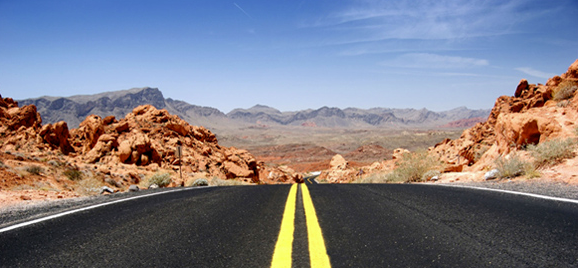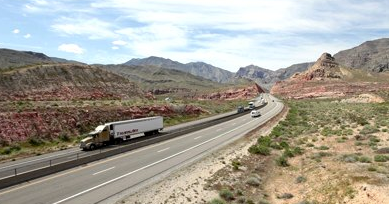Arizona Transit Funds Run Low
 Courtesy of The Republic, AZcentroal.com, by Mary Jo Pitzl :Like the fuel gauge on a car running low on gas, the money that pays for Arizona’s transportation projects is falling fast.
Courtesy of The Republic, AZcentroal.com, by Mary Jo Pitzl :Like the fuel gauge on a car running low on gas, the money that pays for Arizona’s transportation projects is falling fast.
Blame it on more fuel-efficient cars, less driving during the economic downturn and a reluctance by politicians to touch a tax that hasn’t changed in 22 years.
But a change is needed, transportation officials across the state say. Something has to be done about the eroding buying power of the 18-cent-a-gallon gas tax. Deposits into the state’s gas-tax fund have dropped nearly $50 million, or 10 percent, since the high point in December 2007, when the recession hit. On top of that, inflation has eaten away at the financial punch of the gas tax.
John Halikowski, director of the Arizona Department of Transportation, said the decline makes for a bumpy road for transportation projects. He’s facing the irreconcilable convergence of an increasing need to maintain existing roads, a growing demand for new roads and a drop in funds, from the state as well as the federal government.
“All of those things can’t happen,” he said.
Sen. Steve Farley, D-Tucson, agrees. He wrote a bill that proposes a study committee to look for alternatives to the gas tax. The bill left it to the committee to devise any solution, or combination of solutions, and included authorization for pilot studies. Although Senate Bill 1327 easily passed the Senate Transportation Committee, it stalled and is unlikely to happen this year.
Farley said having the “T” word — tax — attached to the bill hurt its prospects, but he’s not giving up.
“I would hate to think our whole infrastructure crumbles because people here weren’t brave enough to actually talk about taxes,” he said.
If he can’t find a way to revive the bill this year, Farley said he’ll convene his own study committee.
“I won’t have the power of the pilot study, but I will have the power of the bully pulpit,” he said.
 Besides, there are enough people in the state worried about future transportation funding that the issue can’t go unanswered for long, he said.
Besides, there are enough people in the state worried about future transportation funding that the issue can’t go unanswered for long, he said.
The state’s long-range transportation plan, which looks out 25 years, foresees a $63 billion gap between needs and revenue. In Navajo County,officials adjusted the cycle for street re-pavement to 68 years from 20 years, citing the drop in funding. A portion of the state gas tax is shared with local governments.
Nationwide issue
It’s not just an Arizona issue. Across the country, states are starting to explore ways to get more mileage out of taxes or fees that support transportation projects.
Mississippi is looking at tacking 10 cents onto its 18-cent-a-gallon gas tax. Oregon is in the midst of a pilot project that charges a tax on miles traveled, instead of gallons of gas consumed. Virginia’s governor is proposing to dump that state’s 17.5-cent gas tax and replace it by raising the state sales tax to 5.8 percent from 5 percent.
In addition to their own local issues with dwindling gas-tax collections, states face the uncertainty of what to do when the federal highway trust fund becomes insolvent, something expected within two years.
In Arizona, the Legislature has diverted money from the funds that finance highways and roads to help balance the budget, compounding the road-funding issue. Those transfers may end with the current budget cycle, but advocates complain they have lost $1.7 billion over the last 12 years due to such maneuvers.
Last week, the Arizona Transportation Board learned it will have to cut $350 million from its five-year construction and maintenance plan due to the drop-off in tax collections. In addition to the gas tax, Halikowski said, the state has seen a decline in vehicle-registration fees and diesel-fuel tax revenue. The $350 million shortfall amounts to a 14 percent reduction.
The board will conduct public hearings over the next few months, but must decide which projects get trimmed, or which get the ax, in June.
David Martin, executive director of the Arizona chapter of the Associated General Contractors of America, said Farley has put his finger on the problem: The gas tax no longer tracks neatly with use of the state’s transportation network.
People who drive electric vehicles or those powered on natural gas don’t pay the gas tax, even though their cars contribute to wear and tear on the roads. Hybrid cars, such as the Priuses that Farley and other lawmakers drive, go a lot farther on a gallon of gas. Sen. Bob Worsley, R-Mesa, said his electric-adapted Prius can get up to 100 miles a gallon.
Looking for alternatives
Worsley supports a study on gas-tax alternatives.
“I think the HURF (Highway User Revenue Fund) fund will continue to suffer as cars get more and more fuel efficient,” he said.
There’s another wrinkle: The gas tax is a flat per-gallon charge.
“There is no inflator to the gas tax to keep up with the rate of inflation,” said Martin. “It’s static at 18 cents.”
It’s been that way since 1992, even though inflation has reduced its financial impact. The tax would have to be 30 cents a gallon today to raise as much money as it did 20 years ago in comparative spending power.
In Arizona, the gas tax is raising about the same amount of money — $450 million a year — as it did a decade ago, even as road needs have increased.
A fee for electric cars?
Farley’s bill proposed the framework for a study committee, charged it with producing recommendations and included authority to test out alternatives.
The tests would be done through pilot programs run by ADOT. They could use technology to identify the number of miles a vehicle travels and methods to collect data from them.
That is similar to the pilot program Oregon is testing for a fee based on miles a vehicle travels. It applies to all types of vehicles and involves 40 volunteers.
Farley is intrigued by the idea, and because of that, wrote another bill that would charge 1 cent a mile to electric vehicles driven on state highways. Senate Bill 1197 is expected to be heard Tuesday in the Senate Transportation Committee.
Martin said the apparent demise of Farley’s study-committee bill points to the need to educate the public about the state’s transportation needs and the mismatch with the money available to address them. The reluctance to hear the bill, Martin said, indicates lawmakers don’t believe the transportation system faces problems.
ADOT’s Halikowski said he suspects a mix of alternatives would be needed if the gas tax is replaced to keep the state from being overly reliant on one revenue source.
And although he listed a number of alternatives being looked at in other states, he said any decision would hinge on what the public would support.
“What do the citizens want out there?” he asked.
“What do you want the system to be in the future?”
Category: Management, News, Transit News










